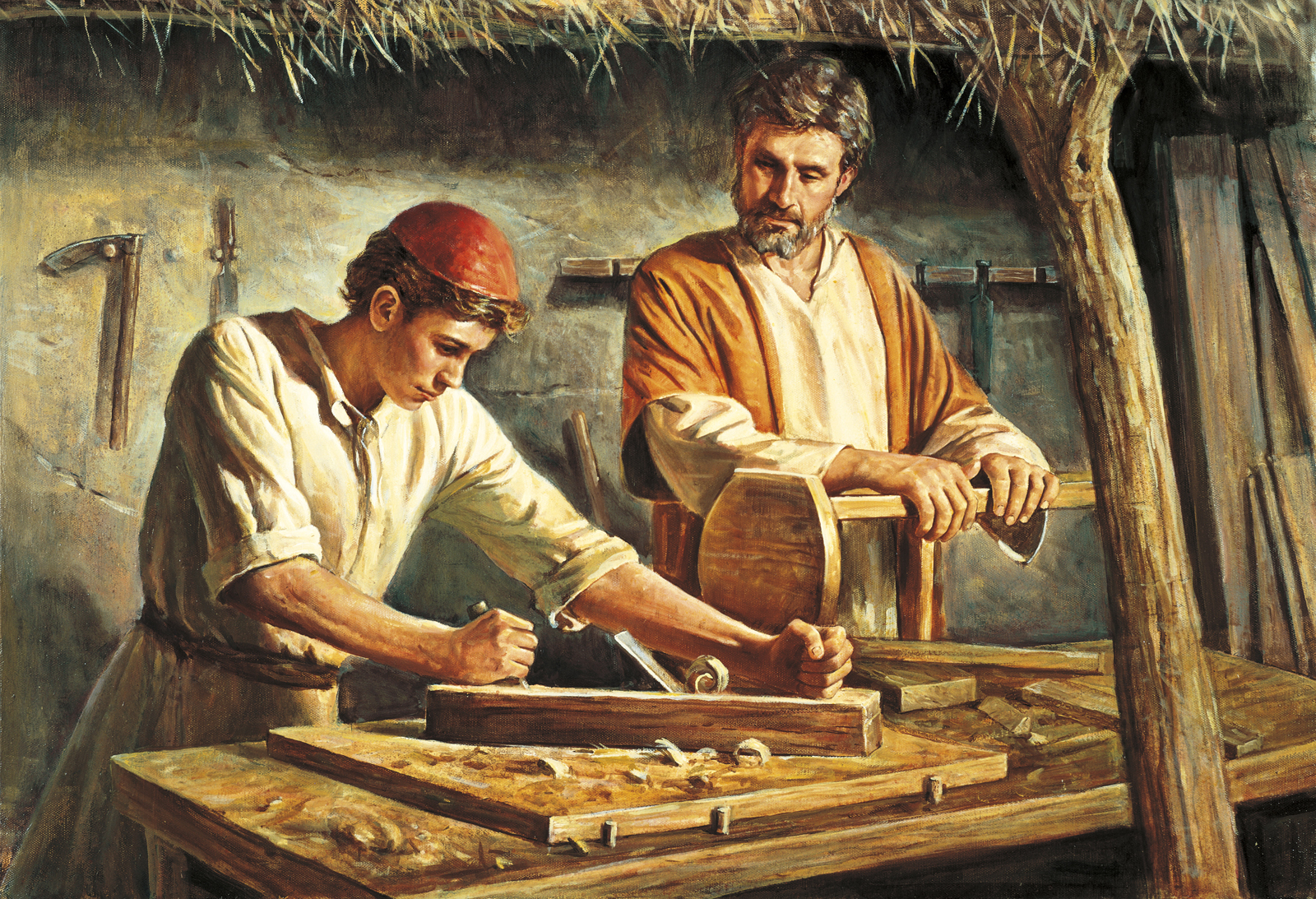I consulted several dictionaries, including the Greek-English Parallel Bible that I love so much, and they all said essentially the same thing: A carpenter is someone who builds and mends things made of wood.
That was no surprise. I mean, I've known what a carpenter is for a long time. But a couple of the entries/translations used another word that adds an extra layer of meaning to this occupation: artificer. An artificer is "a skilled craftsman or inventor" (Google), "a skilled craftsman" (Cambridge Dictionary), or "a person who is skillful or clever in devising ways of making things; inventor" (dictionary.com).
The Oxford English Dictionary offers another, more specific definition for artificer: "God or a god, considered as the creator of the universe."
With that background, we can talk about the symbolism that I think is behind this reference to the Lord.
(1) On a practical and not-really-all-that-symbolic note, I really believe that Jesus chose to labor with His own hands to make a living. He has commanded us to work and be productive (e.g., Doctrine and Covenants 42:42, 1 Thessalonians 4:11-12), and He serves as our example in all things (John 13:15). Even though He is the Son of God and probably could have chosen to sit down and let others serve Him all day, He values hard work. He earned His livelihood.
(2) A carpenter builds. This brings us back to that special word artificer. I think it's significant that this word has been used to refer to the Lord, the Creator of the universe. Christ's occupation of building things on Earth seems to be a temporal representation of His grander spiritual calling of Maker.
(3) A carpenter repairs. What more fitting occupation for the One who repairs like no one else can? I mean, I have no doubt Jesus was skilled with woodwork. But think of how skilled He is when it comes to us, his brothers and sisters! He can take broken hearts, broken minds, and broken spirits and mend them until they are broken no more. He can wash away our sins and infirmities so that "though [our] sins be as scarlet, they shall be as white as snow; though they be red like crimson, they shall be as wool" (Isaiah 1:18).
Elder Jeffrey R. Holland gave a talk entitled "Broken Things to Mend." (If you have time, I cannot recommend this talk enough. He speaks frankly and lovingly about the mental and emotional challenges of this life and, more important, how we can overcome them.) In his address, he quotes a poem (click here to hear this excerpt from his talk):
In Nazareth, the narrow road,
That tires the feet and steals the breath,
Passes the place where once abode
The Carpenter of Nazareth.
And up and down the dusty way
The village folk would often wend;
And on the bench, beside Him, lay
Their broken things for Him to mend.
The maiden with the doll she broke,
The woman with the broken chair,
The man with broken plough, or yoke,
Said, “Can you mend it, Carpenter?”
And each received the thing he sought,
In yoke, or plough, or chair, or doll;
The broken thing which each had brought
Returned again a perfect whole.
So, up the hill the long years through,
With heavy step and wistful eye,
The burdened souls their way pursue,
Uttering each the plaintive cry:
“O Carpenter of Nazareth,
This heart, that’s broken past repair,
This life, that’s shattered nigh to death,
Oh, can You mend them, Carpenter?”
And by His kind and ready hand,
His own sweet life is woven through
Our broken lives, until they stand
A New Creation—“all things new.”
“The shattered [substance] of [the] heart,
Desire, ambition, hope, and faith,
Mould Thou into the perfect part,
O, Carpenter of Nazareth!”
I love this poem. It is so beautiful. Truly, the Carpenter can mend our broken hearts and lives.
(4) Finally, I think it is so significant that Christ is referred to as the carpenter's son (Matthew 13:55). Maybe it was common for sons to take up the trade of their fathers in those days--in fact, it probably was. But I think this reference speaks beyond traditions of the day. I believe that Christ taking up Joseph's trade symbolizes our Savior taking up His Heavenly Father's trade. Consider this scripture found in John 5:
17 But Jesus answered them, My Father worketh hitherto, and I work.
19 Then answered Jesus and said unto them, Verily, verily, I say unto you, The Son can do nothing of himself, but what he seeth the Father do: for what things soever he doeth, these also doeth the Son likewise. (emphasis added)
The Savior then goes on to list a few examples of things that He has seen the Father do and, therefore, has done Himself. Christ followed the example of His father on Earth, just as He follows the example of His Father in Heaven.
I have a testimony of Jesus Christ, the Carpenter and Carpenter's Son. He works, builds, repairs, and does the work of the Father faithfully. I am grateful I have the opportunity to know Him better through the scriptures, until I can meet Him at that great day.

No comments:
Post a Comment